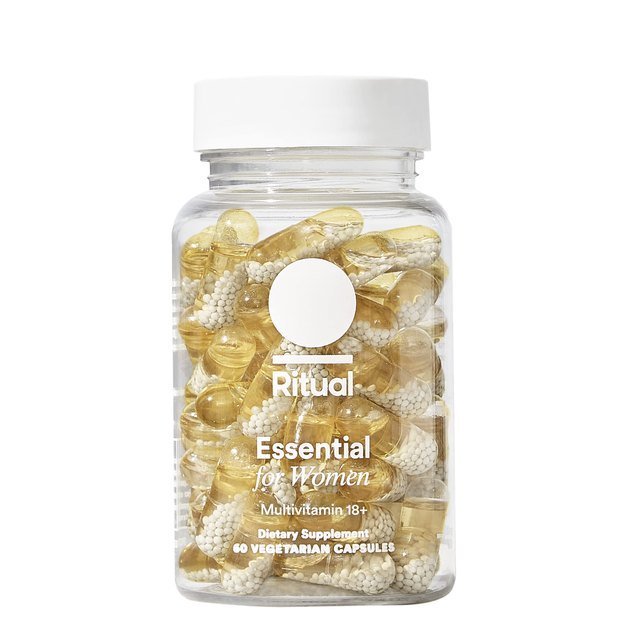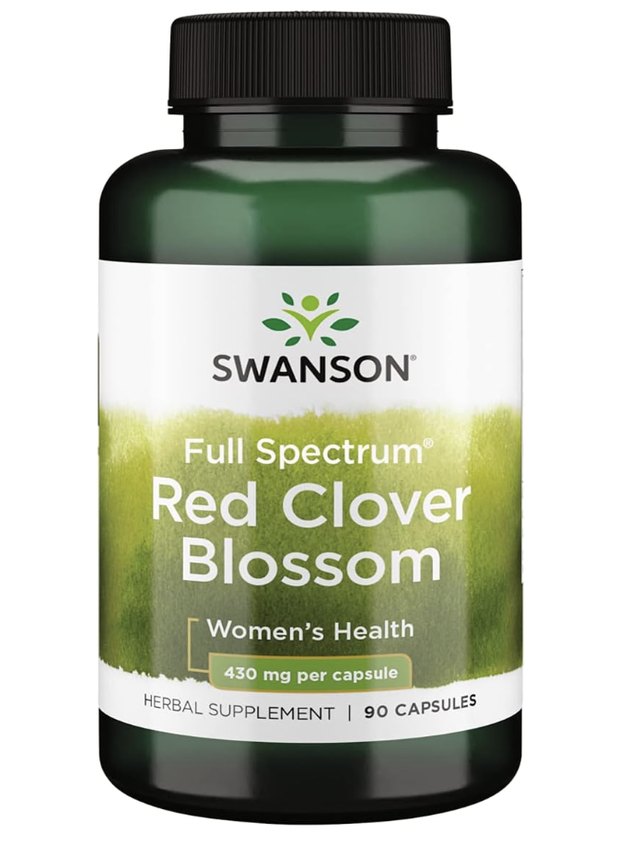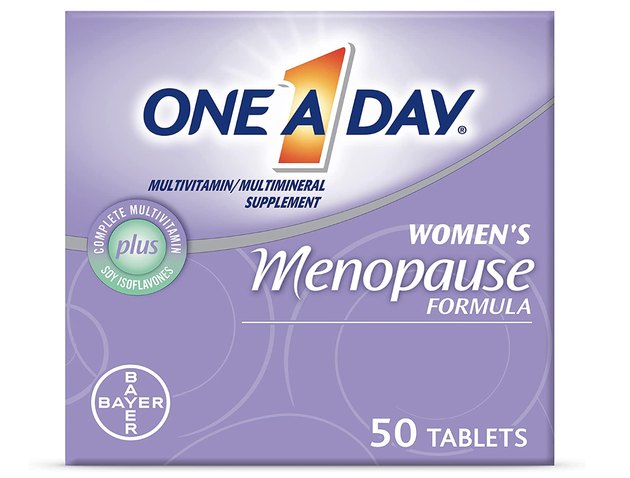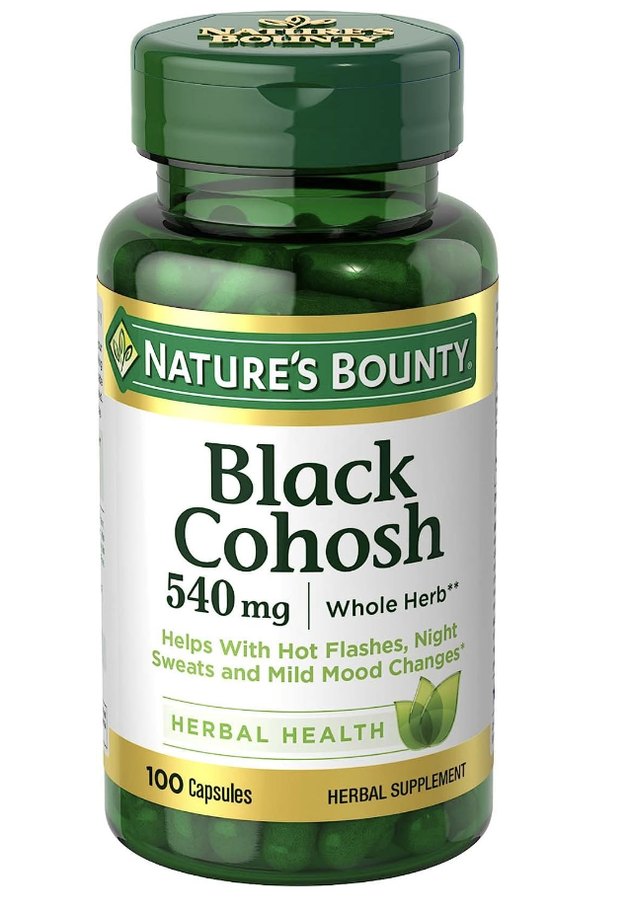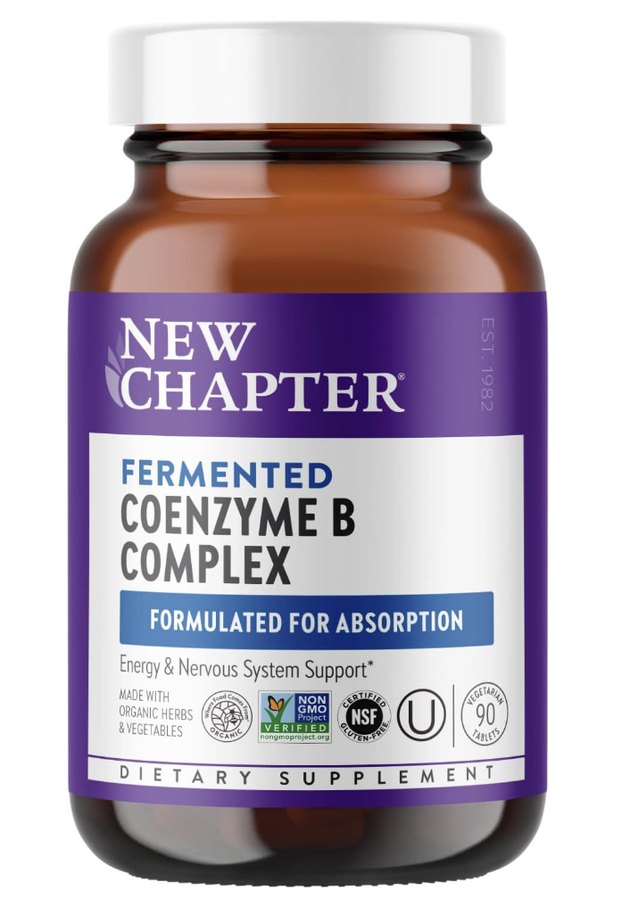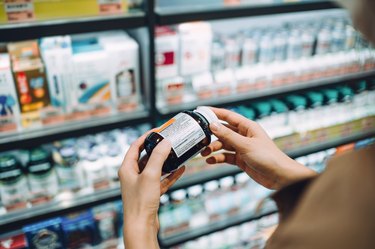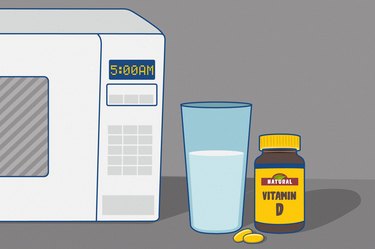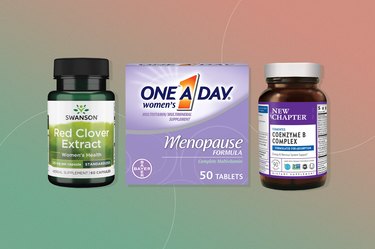
Estrogen levels dip as a person approaches menopause. And that can trigger some uncomfortable symptoms, such as mood changes, insomnia, lowered sex drive and hot flashes, says Felice Ramallo, MSCN, RD, a lead dietitian at Allara, which offers virtual care for people with PCOS.
People may be interested in increasing their estrogen levels as a natural remedy for hot flashes and other symptoms, says Ohio-based ob-gyn Kim Langdon, MD, of Medzino, an online doctor and pharmacy company.
Video of the Day
Video of the Day
And it's not just menopause that can lead to low estrogen levels, Ramallo says. Some procedures — such as chemotherapy and radiation — as well as having low body fat, pituitary gland conditions and premature ovarian failure (POF) can also lead to low estrogen, she says.
Can Vitamins Increase Estrogen?
There are no vitamins that can increase estrogen levels, Dr. Langdon says.
Ramello agrees: "There are no foods or vitamins that can be taken and directly turn into estrogen in the body." And, she notes, "it is unlikely that a food or vitamin will correct clinically low levels [of estrogen]."
But that doesn't mean taking supplements isn't potentially helpful when it comes to easing menopause-related symptoms or alleviating other symptoms (such as bone loss) that may occur with lower levels of estrogen.
If your estrogen levels are low — or if you're experiencing uncomfortable symptoms — make sure to schedule an appointment with your doctor.
While you may be able to easily get supplements without a prescription, talk to your doctor before adding them to your routine. That way, you can ensure there aren't any negative interactions with other medications you're taking.
Supplements That Might Help With Menopause Symptoms
A number of vitamins and supplements come up in conversation around estrogen levels, including those listed below. There are varying amounts of research into the effects of these supplements, and they may not be safe for everyone to take.
Always talk to your doctor before starting these or any other supplements.
- Vitamin D: Despite its name, vitamin D is a prohormone — that is, something your body converts into a hormone, according to the Hormone Health Network. "Vitamin D plays an important role in hormone function and has been shown to balance hormones and improve egg quality," Ramallo says.
- B-complex vitamins: These vitamins "run the body's metabolism," Ramallo says. "They also play a role in hormone production. Supplementing with one can also improve symptoms that include mood changes, poor focus or fatigue." A diet high in vitamin B6 may delay the onset of menopause, according to an August 2018 study in the Journal of Epidemiology and Community Health.
- Black cohosh: This herb is a member of the buttercup family, according to the National Center for Complementary and Integrative Health (NCCIH). It may help reduce menopause symptoms including hot flashes and vaginal dryness, per the NCCIH.
- Boron: Prune juice, raisins and apples are all foods high in boron, a mineral that influences hormones, according to an August 2016 article in Integrative Medicine.
- Fenugreek: This herb is used in spice blends and in supplements, per the NCCIH. A randomized, placebo-controlled study found that people with perimenopausal symptoms taking fenugreek extract reported improvements when it came to hot flashes, night sweats and insomnia, per October 2020 research in the Journal of Food Biochemistry.
- Red clover: The research on red clover's ability to quell menopause symptoms is inconsistent: Some studies show a benefit while others don't, per the NCCIH.
Our Picks
- Best Multivitamin: Ritual Essential for Women Multivitamin 18+ ($33, Ritual)
- Best Red Clover: Swanson High-Potency Red Clover Extract ($10.48, Amazon)
- Best Soy Isoflavones: Bayer One a Day Women's Menopause Formula ($14.02, Amazon)
- Best Black Cohosh: Nature's Bounty Black Cohosh ($7.43, Amazon)
- Best B Complex: New Chapter Vitamin B Complex ($44.53, Amazon)
How We Chose
We spoke with doctors and dietitians as well as reviewed relevant research to recommend the supplements below.
We also looked for products with Current Good Manufacturing Practice regulations enforced by the FDA as well as compliance or verification from one of the three main independent quality control groups that test and review supplements:
For more information on how we choose and cover products, click here.
Tip
Seek out supplements that are third-party certified and look for seals from NSF and USP. “This ensures you are buying a supplement that is free of toxic contaminants and contains the amount of nutrients that it claims,” Ramallo says.
1. Ritual Essential for Women Multivitamin 18+
Pros
- USP-verified
- Contain vitamins for bone health
Cons
- Contains a mint essence, which some people may not like
"Though they do not promote estrogen production, a good quality multivitamin with vitamin D, vitamin K and boron may help with preventing the bone losses associated with low estrogen," Ramallo says.
After menopause, and the loss of estrogen, a person's chances of developing osteoporosis increase, according to the National Osteoporosis Foundation.
Ramallo recommends this vitamin from Ritual. It contains 2,000 IU of vitamin D, 0.7 milligrams of boron and vitamins E, B12 and K2. This multi is USP-verified.
2. Swanson High-Potency Red Clover Extract
Pros
- Helps relieve night sweats
- Contains 430 mg of red clover
Cons
- Contains gelatin, so not the best for vegans
Red clover is an isoflavone, an estrogen-like substance made by certain plants, per the National Cancer Institute (NCI). Red clover may help reduce menopause symptoms, especially night sweats, per a ConsumerLab review that assessed various menopause-related supplements.
Opt for a supplement that includes a minimum of 40 milligrams of total isoflavones, according to ConsumerLab. This supplement from Swanson has 430 milligrams per capsule.
3. Bayer One a Day Women's Menopause Formula
Pros
- Contains other essential nutrients like vitamin C, D, E and calcium
- ConsumerLab approved
Cons
- Can cause stomach upset in some people, according to reviews
Soy isoflavones may help reduce hot flashes and vaginal dryness, per a June 2016 meta-analysis in JAMA. This once-daily supplement contains 60 milligrams of soy isoflavones.
It's also a source of several other key vitamins and minerals, including vitamins C, D and E and calcium and zinc. This one's approved by ConsumerLab.
4. Nature's Bounty Black Cohosh
Pros
- Soy-, gluten-, yeast-, fish- and lactose-free
- ConsumerLab approved
- Widely available
Cons
- Can leave a taste in your mouth, according to reviewers
The herb black cohosh may help cut down on some of the symptoms of menopause, Dr. Langdon says. Black cohosh has been used for generations in Indigenous and Chinese medicine, helping to relieve the symptoms of many gynecological conditions, such as PMS, cramps and menopause, per the Cleveland Clinic.
This particular supplement is approved by ConsumerLab and is free from soy, gluten, yeast, fish and lactose. It's also affordable and widely available at many drugstores.
5. New Chapter Vitamin B Complex
Pros
- NSF-certified
- Fermented to offer probiotics
- Non-GMO
Cons
- Some reviewers say the pill is too large and can be hard to swallow
B vitamins are essential for your body. Ramallo recommends New Chapter Vitamin B Complex. It contains vitamins B12 and B6, biotin, riboflavin, thiamin, niacin, folate and pantothenic acid.
"This one also contains fenugreek and maca, two herbal supplements that have some evidence for improving estrogen levels," Ramallo says. This pick is NSF-certified.
- National Cancer Institute: "isoflavone"
- Hormone Health Network: "Vitamin D"
- Journal of Epidemiology and Community Health: "Dietary intake and age at natural menopause: results from the UK Women's Cohort Study"
- National Center for Complementary and Integrative Health: "Black Cohosh"
- Integrative Medicine: "Nothing Boring About Boron"
- Biological Trace Element Research: "The Physiological Role of Boron on Health"
- NCCIH: "Fenugreek"
- Journal of Food Biochemistry: "Efficacy of a novel extract of fenugreek seeds in alleviating vasomotor symptoms and depression in perimenopausal women: A randomized, double-blinded, placebo-controlled study"
- NCCIH: "Red Clover"
- ConsumerLab: "Menopause Supplements Review (Soy and Red Clover Isoflavones, Black Cohosh) and Progesterone Creams"
- National Osteoporosis Foundation: "What Women Need to Know"
- JAMA: "Use of Plant-Based Therapies and Menopausal Symptoms"
- Cleveland Clinic: "Black Cohosh"
